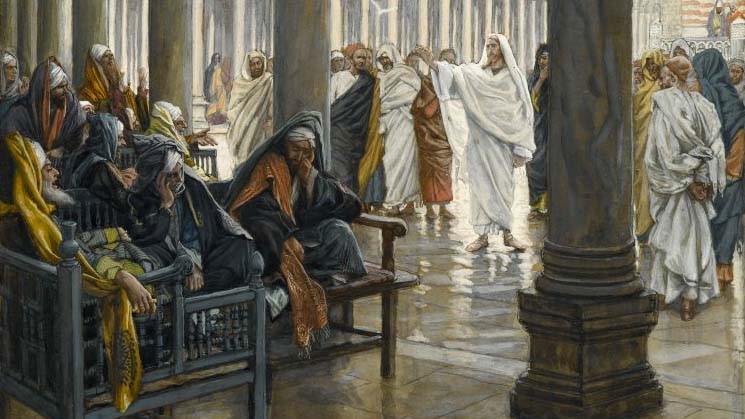
7 March 2023 – Matthew 23:1-12
The words of today’s Gospel seem to be an attack on the Pharisees, but in reality they should be directed against certain members of the Christian community, particularly its leaders. Jesus accuses the Pharisees of hypocrisy, of doing good only in appearance.
1. They do not practise what they teach (v. 3). They lack integrity of life and do not do what they preach, namely justice, mercy and charity.
2. They overburden the common people (v. 4). The scribes and Pharisees, in their excessive zeal for God’s laws, have divided the 613 laws of the Torah into thousands of rules and regulations affecting every act of the people, thus making God’s laws a heavy burden.
3. They do all their deeds to be seen by others (v. 5).
Jesus accuses the scribes and Pharisees of seeking the glory that rightly belongs to God alone. They express their love of honour in various ways, thus turning Judaism into a religion of ostentation:
▪ They make their phylacteries wide and their fringes long (v. 5).
▪ They love to have the first places at banquets and the first seats in synagogues (v. 6).
▪ They love to be received with respect in the squares and to be called rabbi” (v. 7).
Jesus’ words are a warning to all people in authority, not only those of his time, but also those in our society: managers, doctors, lawyers, bishops, priests, civil servants, parents can all be included. To the extent that their authority is genuine, they should be heard: the doctor for medical things, the lawyer for legal things, the priest for spiritual things, the parent for family matters…
The Pharisees, on the other hand, only manifested their authority and importance by wearing wider phylacteries and longer tassels. Phylacteries were small boxes containing scripture verses that were worn on the left forearm and forehead. The tassels, worn at the corners of the robe, were prescribed by Mosaic law as a reminder to keep the commandments. Wearing each of these elements drew attention to one’s superior devotion and observance.
Indeed, a vice of the so-called ‘Phariseeism’ consisted in focusing goodness in the formal (heartless) fulfilment of certain precepts, which were not so much of God as of a twisted human casuistry. In this the core of every temptation is clear: to put our world in order alone, without God, relying solely on our own abilities (Benedict XVI).
For the good workers.
“I am like a little pencil in His hands, nothing else. It is He who thinks. It is He who writes. The pencil has nothing to do with this. The pencil only needs to be able to be used.” Mother Teresa
P JOBY AKVUNGAL RCJ

